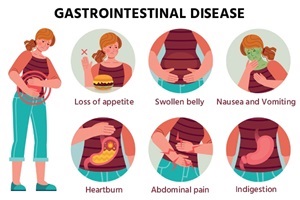Gastrointestinal Disease: Common Digestive Disorders
Gastrointestinal Disease: Common Digestive Disorders, Symptoms and Treatments
The GI tract, pancreas, liver, and gallbladder comprise the digestive system that aids in the body’s food digestion.
The process of digestion is critical for converting food into nutrients that your body can use for growth, repair, and energy.

There are both short-term disorders and long-term diseases and conditions affecting the digestive system.
What is a gastrointestinal disease?
A sickness that affects the digestive system, also known as the gastrointestinal tract or GI tract, is said to be gastrointestinal.
This is because the GI tract connects the mouth to the bowel.
Hemorrhoids, acid reflux, indigestion, irritable bowel syndrome (IBS), and colon cancer are examples of common GI illnesses.
Any illness or ailment that affects the gastrointestinal system is referred to as a “gastrointestinal disorder.”
Our oral cavity, esophagus, stomach, small intestine, large intestine, and anus are the organs that comprise our gastrointestinal system (GI tract).
The digestive system consists of the gastrointestinal tract, the liver, the pancreas, and the gallbladder.
These organs receive blood flow from a vast network of blood vessels, which also transfer nutrients to other organs throughout the body.
Together, nerves and hormones control how the digestive system functions, and the bacteria that live in our GI tract—also referred to as our gut flora or microbiome—affect immunity, digestion, and general health.
The peritoneum, a membrane sac, holds every organ of the digestive system in place.
What are functional gastrointestinal diseases?
In functional disorders, the gastrointestinal system appears normal on physical inspection but does not function normally.
These are the most typical GI tract issues, which include your colon and rectum.
Common instances include diarrhea, bloating, gas, nausea, constipation, and irritable bowel syndrome (IBS).
Several factors can affect your GI tract’s motility (or capacity to continue moving), including:
- Consumption of a low-fiber diet.
- Doing too little physical activity.
- Traveling or undergoing other usual adjustments
- Consuming copious quantities of milk and yogurt.
- Maybe due to hemorrhoids, restraining oneself from the impulse to go to the bathroom
- Overuse of anti-diarrheal drugs can impair motility and the movement of the bowel muscles over time.
- Utilizing calcium- or aluminum-containing antacid medication.
- Using specific medications (antidepressants, iron supplements, and potent analgesics like opioids in particular).
Additionally, some people experience visceral hypersensitivity, which is an increased sensitivity in the GI tract’s organs.
Even when the organs are operating regularly, this may cause them to experience pain or discomfort.
What are structural gastrointestinal diseases?
When you have a structural gastrointestinal disorder, both the appearance and functionality of your colon are aberrant.
Occasionally, surgical removal of the structural defect is required.
Strictures, stenosis, hemorrhoids, diverticular disease, colon polyps, colon cancer, and inflammatory bowel disease are typical instances of structural GI disorders.
A list of gastrointestinal diseases
Numerous illnesses or disorders can disrupt the GI tract, which can then affect digestion and/or our general health.
Certain illnesses present with identical symptoms, so a doctor may need to do further tests before making a diagnosis.
Typical gastrointestinal conditions consist of the following:
- Diverticular disease: This long-term condition is characterized by tiny ruptures or pockets in the gut called diverticula.
When undigested food becomes stuck in the diverticula, it can lead to inflammation, which can cause pain, constipation, and occasionally fever, nausea, or cramps.
Diverticulitis is the term for this. A frequent condition that affects 50% of all adults over 60 is diverticular disease.
Though some people have a hereditary susceptibility to the condition, low-fiber diets are regarded to be the main cause.
Diverticular disease is typically detected during a colonoscopy performed to check for colorectal cancer, even though many patients with the disorder don’t exhibit any symptoms.
Usually, a high-fiber diet and a mild painkiller are used as treatments.
- The medical term for acid reflux disease, or gastroesophageal reflux disease, is GERD: The condition arises from a weakening of the lower esophageal sphincter, a ring of muscle fibers that surrounds the opening to our stomach.
- Rather than closing tightly to stop food from flowing back up our esophagus, it remains partially open, allowing partially digested food and stomach acid to escape and irritate our esophagus.
Heartburn, nausea, chest pain, and regurgitation are the main signs and symptoms of GERD.
The most popular treatments for GERD include proton pump inhibitors, H2 blockers, and antacids.
- Inflammatory bowel syndrome, or IBS, is when your bowel habits change and you feel pain in your stomach.
This is what the American College of Gastroenterology says IBS is.
Most people need to see at least three separate doctors and wait three years to receive an IBS diagnosis.
The fact that IBS can appear in so many various ways contributes to the challenge of diagnosis.
Constipation-predominant IBS (IBS-C), diarrhea-predominant IBS (IBS-D), and mixed IBS (constipation and diarrhea at various times) are the three types of IBS that some people are more prone to encounter than others.
In addition, several other illnesses, including giardiasis, endometriosis, food allergies, and inflammatory bowel disease, share symptoms with IBS, which is why the majority of these ailments must be ruled out before an IBS diagnosis can be established.
Treatment for IBS typically consists of medication and dietary modifications, depending on the patient’s predominant diarrheal or constipation type.
- Colorectal cancer and polyps: they are enlargements that develop on the inside of the colon. There are primarily two kinds.
Adenomas or adenomatous polyps are one type that should be entirely removed if detected because of their high risk of developing colorectal cancer.
For both men and women in America, colorectal cancer ranks third in terms of cancer-related mortality.
Because colorectal cancer is more common in persons between the ages of 45 and 75, colorectal cancer screening is crucial.
Depending on the stage at which the disease is discovered, radiation treatment, chemotherapy, and surgery may be used to treat colorectal cancer.
Peptic ulcer disease (PUD): Due to small holes that can form in the lining of your stomach (gastric ulcer) or upper portion of your small intestine (duodenal ulcers), both types of ulcers are referred to as Peptic Ulcer Disease.
The most prevalent kind, duodenal ulcers, are more common in men between the ages of thirty and fifty.
The majority of persons with gastric ulcers are middle-aged or older.
Although most individuals never have ulcers, the most frequent cause is an infection with the bacteria Helicobacter pylori (H. pylori), which is typically picked up in childhood.
Smoking, high stomach acid production, and overuse of anti-inflammatory medications like aspirin, ibuprofen, or diclofenac are other typical reasons.
Heartburn and stomach pain are common symptoms.
While eating tends to exacerbate the pain associated with gastric ulcers, it tends to alleviate the pain associated with duodenal ulcers.
Typically, treatment comprises treatments to remove the H. pylori infection and drugs to protect or lessen stomach acid production.
Other gastrointestinal diseases include:
- Appendicitis,
- Indigestion (dyspepsia),
- Gastritis,
- Vomiting
- Constipation
- Diarrhea
- Hemorrhoids and anal fissures
- Lactose intolerance
- Malabsorption syndromes
- Crohn’s Disease
- Celiac disease
- Short bowel syndrome,
- And intestinal ischemia
- Hiatal hernia.
- Gallstones
- Fecal incontinence
- Gastroenteritis
- Hirschsprung disease
- Abdominal adhesions,
- Barrett’s esophagus,
- Intestinal pseudo-obstruction, pancreatitis,
- Short bowel syndrome,
- Ulcerative colitiWhipple’s disease,
- Zollinger-Ellison syndrome,
Early signs of gastrointestinal disease
Listed below are some early signs of GI diseases:
- Modification in bowel routines.
- Weight loss without explanation.
- A loss of bowel control or rectal hemorrhage.
- Weariness or weakness.
- Cramps or soreness in the abdomen.
- Insufficient bowel motions
What are the 5 diseases of the digestive system?
Among the five prevalent digestive system illnesses is
- Irritable bowel syndrome (IBS).
- IBD, or inflammatory bowel disease
- GERD, or gastroesophageal reflux disease
- Celiac illness.
- The diverticulitis.
How is the gastrointestinal disease diagnosed?
Ultrasounds, MRIs, CT scans, X-rays, and upper gastrointestinal series (UGI) are common imaging studies for diseases related to the stomach.
When combined with an X-ray, a barium swallow or barium enema can provide an even sharper image of the digestive system.
Gastrointestinal disease symptoms
Typical symptoms consist of:
- A modification of regular bowel patterns.
- Either black or bright blood on or in the stool.
- Unusual gas or stomach aches.
- Little stool.
- A sensation that after passing stool, the bowel has not yet fully empty.
- Unaccounted-for weight loss.
- A feeling of exhaustion.
- Low blood count or anemia.
Gastrointestinal disease and cancer symptoms
Symptoms and indicators of stomach cancer include:
- An uncomfortable or scorching feeling in the stomach.
- Heartburn dyspepsia, or indigestion
- A feeling of satisfaction even following a light meal.
- Vomiting and/or nausea.
- Appetite decline and/or weight reduction.
- Abdomen’s enlargement.
- Inexplicable weakness or fatigue.
- Blood in the poop.
Gastrointestinal disease causes
Your GI tract’s motility, or capacity to continue moving, can be disturbed by a variety of circumstances, including:
- Eating a low-fiber diet.
- Not working out enough.
- Travel or other alterations to one’s routine.
- Consuming a lot of dairy products.
- A lot of stress.
- Maybe due to hemorrhoids, restraining oneself from the impulse to go to the bathroom.
Diagnosis and Treatment
Depending on the kind, cause, and severity of the illness, there are many different approaches to diagnosing and treating gastrointestinal diseases.
Your healthcare professional will collect information about your lifestyle, health history, and symptoms to diagnose these disorders and decide which tests are necessary to look into the matter further.
A gastrointestinal disorder can be diagnosed using several tests, such as:
- Endoscopic retrograde cholangiopancreatography (ERCP)
- Endoscopy
- Endoscopic ultrasound
- Capsule endoscopy
- Upper GI endoscopy
The problem will not be treated until a correct diagnosis has been made.
Depending on the situation, making dietary and lifestyle changes can help alleviate certain gastrointestinal disorders.
In case dietary and lifestyle modifications prove insufficient, your physician will probably recommend medicine tailored to your unique condition.
Antibiotics might be used, for instance, if your symptoms are caused by a bacterial infection.
To assist in managing pain and other symptoms, additional medications can be required if you have a chronic illness that lasts a lifetime.
Among the drugs used to treat different digestive issues are:
- Antacids for reflux disease
- Medications to treat persistent diarrhea
- Laxatives or stool softeners for long-term constipation
- Prescription drugs for anxiety-related problems
- Antidepressants to treat IBS symptoms 31
- College of Michigan. Functional gastrointestinal diseases can be treated with antidepressants.
- Drugs used to lessen colonic inflammation
Preventing Gastrointestinal Disease
Although it is not possible to prevent every GI disease, leading a healthy lifestyle is the best defense against them. This entails:
- Consuming a balanced diet rich in fruits, vegetables, and the recommended quantity of fiber
- Obtaining restful sleep
- Drinking adequate water to stay hydrated
- Because prolonged exposure to high-stress levels has been linked to the development of some GI disorders, it stands to reason that avoiding or at least managing stressful situations whenever feasible would be beneficial.
- There is evidence that for certain individuals, engaging in mild physical activity can alleviate the symptoms of gastrointestinal disorders.
For those who exercise regularly, it can help avoid flare-ups even though the exercise itself might not be able to prevent GI disease.

Conclusion
A variety of GI disorders can have an impact on your digestive tract’s health as well as how effectively your body breaks down food.
Though they differ, the symptoms of the two primary categories of GI disease—structural and functional—can appear identical.
Even though they can cause crippling symptoms and a reduced quality of life, the majority of GI disorders are treatable.
Constant diarrhea or constipation, stomach pain, nausea, vomiting, and bleeding are common symptoms.
Due to the wide range of GI ailments and their differing symptoms, it’s critical to see a healthcare professional for an accurate diagnosis.
Getting the diagnosis right is crucial to treating your gastrointestinal ailment because treatment will differ greatly depending on it.
FAQs
How can I treat gastrointestinal disease?
Taking a lot of fluids and resting.
Consuming the BRAT diet, which consists of toast, applesauce, rice, and bananas, all of which are light on the stomach and healthful in their own right.
On the other hand, stay away from items that can aggravate your digestive system, such as dairy, fats, and spices.
What causes gastrointestinal?
An infection and inflammation of the stomach and intestines is known as gastroenteritis.
This is a prevalent ailment that can be attributed to numerous factors such as viruses, germs, parasites, toxins, chemicals, and medications.
Gastroenteritis comes in several forms, the majority of which are communicable.
Where does gastrointestinal disease hurt?
The majority of your small and large intestines are located in your lower belly.
The majority of the time; gastrointestinal disorders are connected to lower abdominal pain.
Urinary tract, ovary, or uterine issues are additional possible causes.
What is the best medicine for the gastrointestinal system?
Your doctor might recommend a proton pump inhibitor (PPI), such as Nexium, Prevacid, Prilosec, Protonix, or Aciphex if you frequently get ulcers, stomach acid, or heartburn.
Patients with excess stomach acid, stomach or intestinal ulcers, or heartburn use these drugs.
What foods heal gastrointestinal disease?
These five items can help you avoid typical stomach issues and encourage better digestion.
- Complete grains.
- Rice: white or brown
- Leafy greens,
- Lean protein,
- Low-fructose fruits,
- Avocado and more.
What foods to avoid if you have gastrointestinal problems?
The foods that are worst for your digestive system
- Deep-fried cuisine: During the frying process, deep-fried meals absorb large amounts of lipids, such as oil, shortening, or lard.
- Processed foods
- Foods high in fat
- Coffee
- Spicy foods
- Alcohol
- Citrus fruits and chocolate.
How can I treat gastrointestinal disease at home?
Changes in diet and lifestyle can have a significant impact:
- Give up smoking.
- Eat less high-fat foods.
- Steer clear of carbonated beverages.
- Eat and sip mindfully.
- Avoid chewing gum.
- Steer clear of gas-producing sweets like sorbitol and fructose.
- Work out more.
- Eat nothing that gives you gas.
Can gastrointestinal go away?
Although gastroenteritis can be quite uncomfortable, it normally goes away on its own in a week or so.
Typically, you can take care of your child or yourself at home until you feel better.
Keep in mind that gastroenteritis can readily spread to others, so try to avoid seeing your doctor.
What are the warning signs of gastrointestinal bleeding?
- Dark or rough stool.
- Crimson blood in the vomit.
- Abdominal cramps.
- Stool mixed with blood, either bright red or dark.
- Lightheadedness or fainting.
- Feeling worn out.
- Dullness
- Respiration difficulty.
What organs does a gastroenterologist treat?
The study of disorders and normal function of the esophagus, stomach, small intestine, colon, rectum, pancreas, gallbladder, bile ducts, and liver is gastroenterology.
What are 3 diseases that affect the intestines?
Intestinal disorders include diverticulitis, malabsorption, small bowel syndrome, intestinal ischemia, cancer and polyps, infections, and Crohn’s and celiac disease.


